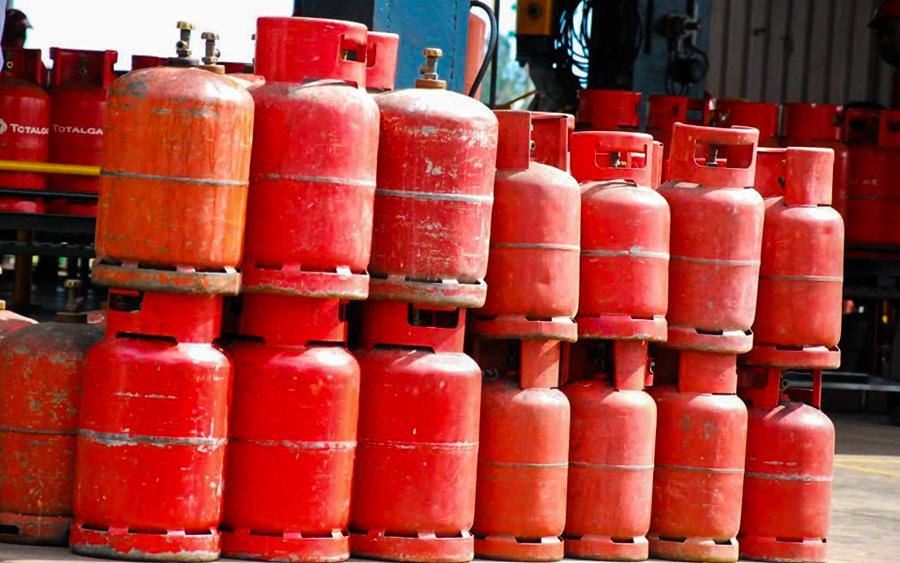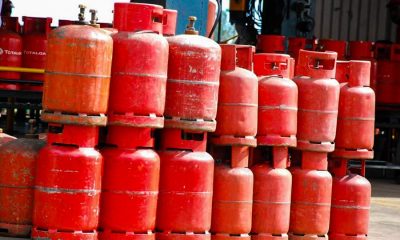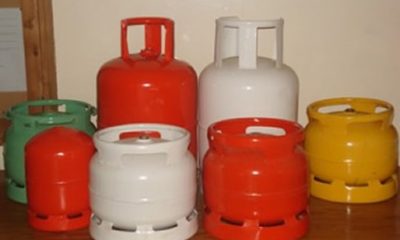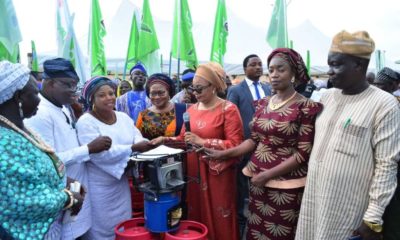News
Cooking Gas May Rise To N10,000 In December – Marketers Warn

The National Association of LPG Marketers (NALPGAM) yesterday warned that the price of cooking gas might rise to N10, 000 per 12.5-kg cylinder before December.
NALPGAM, an association of indigenous private companies with operating gas bottling plants, explained that the federal government had refused to issues that led to the rise of cooking gas prices.
The Executive Secretary of NALPGAM, Mr. Bassey Essien gave the warning at the weekly e-Discourse organised by leading a pan-African forum, Platforms Africa.
Platforms Africa is the e-community of intellectuals, policy moulders and opinion leaders in continent, a forum being coordinated by award-winning Nigerian journalist, Adeola Yusuf.
At the session, Essien explained that if the government refused to address the recently introduced import charges and VAT, the price of cooking gas might as well reach N10, 000 for a 12.5-kg cylinder.”
Essien said the skyrocketing price of gas “is our fear and what we are trying to avoid. Early in the year a 20 metric ton of gas was selling for below N5 million, but today same tonnage sell for N10.2 million.
“As long as there is that supply shortage, the available quantity and the dynamics of supply-demand will keep pushing the price higher.
“If government does not address the recently introduced import charges and VAT, the price of cooking gas may as well reach N10,000 for a 12.5kg cylinder. Today the price has risen to N7, 500 and N8, 000.”
Lamenting poor patronage of NALPGAM by customers due to the high price,. Essien said more Nigerians “are being forced to return to coal, sawdust, kerosene, and other dirty fuel.
“The Association is very concerned with the high cost as many Nigerians are resorting to the use of firewood, charcoal and kerosene to cook and the prices of these cooking energy have suddenly gone up.
“The association is interfacing with Government, Stakeholders, producers, importers to see how the situation can be arrested, as well as meeting with the marketers vide moral suasion not to capitalise on the situation and inflict more pains on citizens by increasing the cost of gas in their locations.
“However, they are equally expending huge cost to have cooking gas at their locations,” he explained.
Asked whether there is any hope in sight, Essien said: “Unfortunately, there is none in sight for now except the supply is increased. NLNG says it has supplied all its production quota into the market.
“Other available sources in-country are still negligible to address the shortfall in supply,” NALPGAM’s executive secretary said at the weekly e-discourse platform.
He explained that the cost of cylinders “has been on the gradual rise over the years. We have about 2 cylinder manufacturing plants in the country and all the elements of production are imported, note the import implications.
“The cylinder ownership structure in the country ensures that owners are in charge of their cylinders. Cylinders expire on the 15th year of usage from the manufacturing date.
“Because of the high replacement cost, consumers buy what they can afford. This has equally encouraged the proliferation of substandard cylinders in circulation,” NALPGAM’s executive secretary said.
According to him, skyrocketing price of gas is our fear and what we are trying to avoid. Early in the year a 20metric ton of gas was selling for below N5 milion but today same tonnage sell for N10.2m.
“As long as there is that supply shortage, the available quantity and the dynamics of supply-demand will keep pushing the price higher. If government does not address the recently introduced import charges and VAT, the price of cooking gas may as well reach N10,000 for a 12.5kg cylinder. Today the price has risen to N7,500 and N8,000.”
“Despite the over 180million population of the country, we hardly have up to 10million cylinders in circulation.
“The regulators are working hard to monitor the standard of cylinders coming into the country.
“The progress in cylinder acquisition still needs government input to ensure that the cost of materials for cylinder production get the necessary exemption from duties but however the state of our local currency still remains a major problem,” Essien said.
Team Lead, Platforms Africa, Adeola Yusuf, however, called on the Federal government to wade in and save a lot of Nigerians the pains of paying higher for gas.
“The decade of gas plan and a lot of feats recorded by the Federal government in the gas sector is being threatened by this crisis and no time is better than now for the government to save the ship of its gas achievements from sinking,”
-

 News4 days ago
News4 days agoUpdated: Oyo Police Parade Arrested Yoruba Nation Agitators
-

 News3 days ago
News3 days agoJust In: Adeleke Appoints Former Osun Commissioner For Finance, Bolorunduro Chairman Of Living Trust Mortgage Bank
-

 News4 days ago
News4 days ago‘21 Chibok Girls Return With 34 Kids; 48 Parents Die Of Trauma’
-

 News24 hours ago
News24 hours agoBreaking: JAMB Directs CBT Centres To Arrest Parents Found Near Facilities During UTME Exercise









